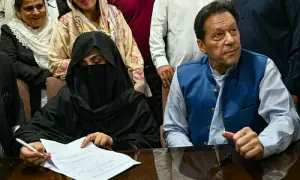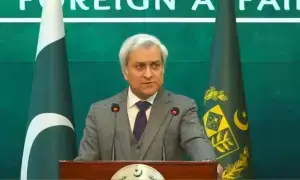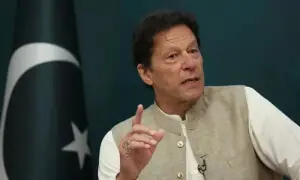CJP tried to make full court, claims PTI’s Waleed
3 min readThe chief justice of Pakistan tried to make a full court on the Supreme Court amendment bill, PTI’s Waleed Iqbal claimed. But seven judges of the top court “were not ready” to sit with two other judges.
Before making such claims on Asma Shirazi’s show Faisla Aap Ka on Monday, Iqbal said he was giving the statement on the basis of hearsay. He added it could be true.
Waleed was responding to a query on the apex court’s decision to form a bench on the law even before it took effect.
“The formation of the bench when a matter comes and it has to be taken up was the prerogative of the CJP as per the law in place. And I want to tell you that the demand for a full court, I am telling you according to my information it is possible that it can be true or not that judges who have a disagreement with the CJP… CJP recently tried to form a full court. But on this other judges say that by naming the two judges we will not sit in the full court with them. So how there will be a full court,” he said.
When asked that even a full court meeting was not called, Waleed said: “If the rest of the seven judges are not ready to sit with the two judges then it would be six or seven if you exclude the two.”
The Supreme Court comprises 15 judges, according to the top court website. There are also two ad-hoc members of the Shariat Appellate Bench.
The PTI leader was apparently talking about Justice Ijazul Ahsan and Justice Sayyed Mazahar Ali Akbar Naqvi. In February, the government sought the recusal of the two judges from the SC hearing elections case.
The PML-N had filed a reference against Justice Naqvi after his name surfaced in connection with an alleged audio leak.
“Judges who are in disagreement with the CJP as I see the CJP is adamant on the 90 days period written in the Constitution [for the elections after the dissolution of assemblies] on this case. The rest of the judges, who oppose him [CJP], are stuck on suo motu [powers] and the formation of the bench. Now we don’t know what are their views on the 90-day limit, however, they are intentionally or unintentionally rewriting the Maulvi Tamizuddin case,” Waleed said.
When asked that has it ever happened that the SC had suspended a bill, the PTI leader said such a development took place during General Musharraf’s period when Hasba bill was tabled? Shirazi corrected him that it was a presidential reference that was presented when a dictator was ruling. But Waleed replied the merits don’t change, adding that SC’s April 13 decision was an interim order.
SC suspends bill aimed at clipping CJP’s powers
The Supreme Court suspended on April 13 a law that is yet to take effect. The Supreme Court Procedure and Practices Bill 2023, which governs the use of discretionary powers of the chief justice of Pakistan, will take effect on April 20.
An eight-member Supreme Court of Pakistan bench heard petitions against the upcoming law on Thursday and adjourned for an indefinite period after issuing notices to political parties, the Pakistan Bar Council and the Supreme Court Bar Association.
However, in the written order issued later in the day the court suspended the law after admitting that “ordinarily the provisions of a law cannot be suspended because this Court can only suspend a particular order, judgment or action.”
The court said it was making the unusual move because the parliament had enacted a law that was “not permissible under any constitutional provision” and once that law comes into force it will affect the working of the top court.
For the latest news, follow us on Twitter @Aaj_Urdu. We are also on Facebook, Instagram and YouTube.






















Comments are closed on this story.